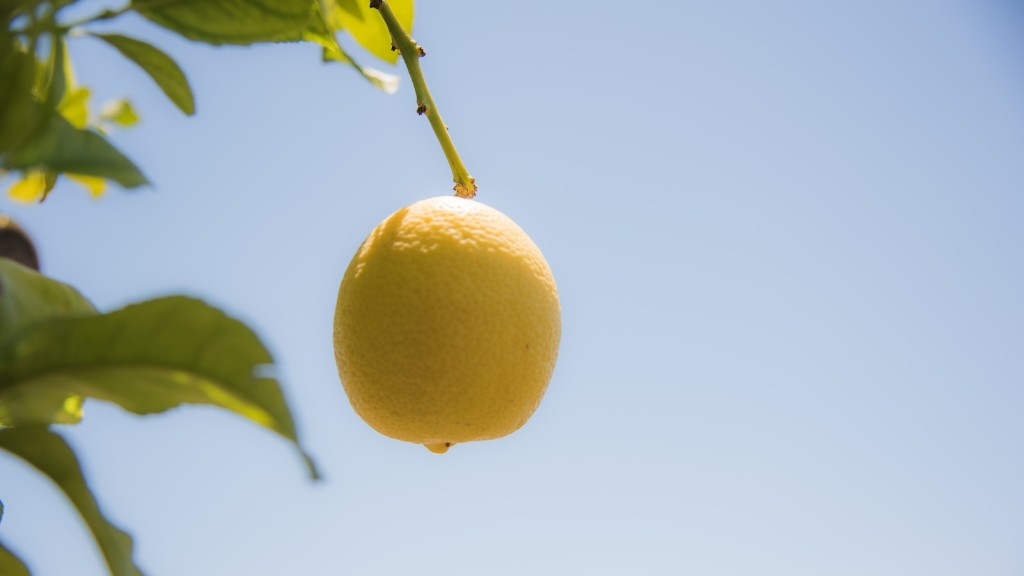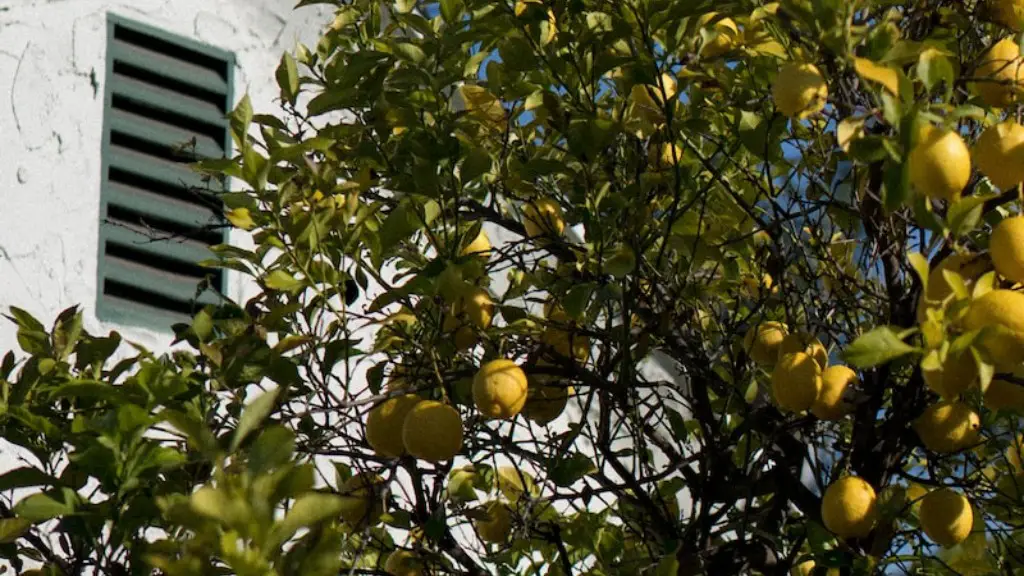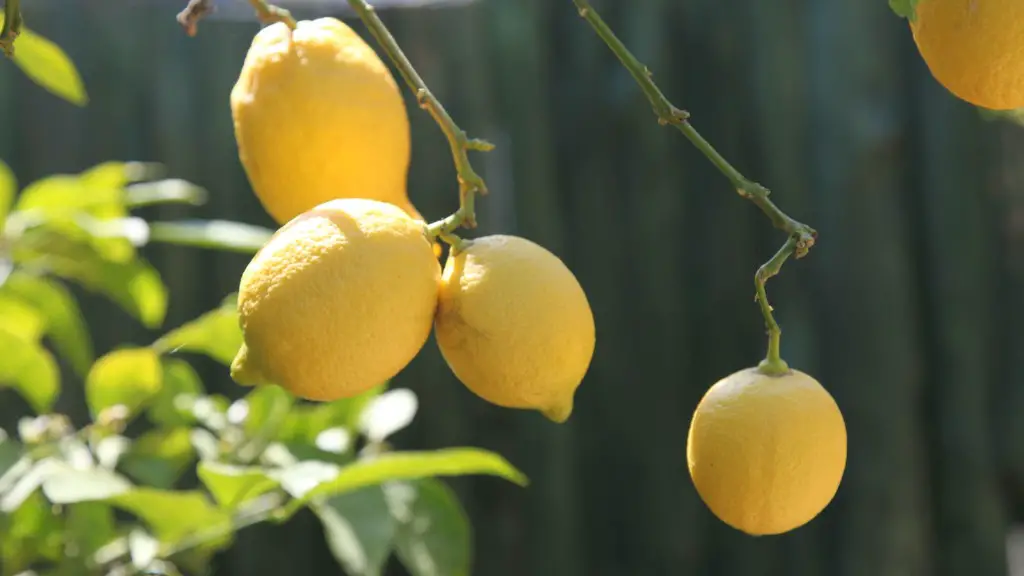A lemon tree can grow to be quite large, depending on the type of lemon tree it is. The Eureka lemon tree, for example, can grow to be 20 feet tall.
There are many different types of lemon trees, so it is hard to give a definitive answer. Generally, lemon trees can range from 6 to 20 feet tall.
How much space does a lemon tree need?
This is important to know when planting citrus trees, as the spacing will affect how big the trees and fruits grow. If you want big fruits, you need to space the trees further apart so that they have room to grow.
Pruning is an important part of keeping your lemon tree the size you want it to be. You can prune lightly all year round to keep it from getting too tall. When making a cut, angle the branch slightly and make the cut just above two healthy leaves.
How quickly do lemon trees grow
Lemon trees are a fast-growing citrus tree that can produce fruit within a few years. They are a popular choice for home gardens and orchards as they are relatively easy to care for and produce a high yield of fruit. Lemon trees can grow up to 12 feet tall and live for over 20 years with proper care.
Meyer lemon trees are a type of citrus tree that can grow to be 6 to 10 feet tall. The dwarf variety of Meyer lemon tree grows to be about 5 to 7 feet tall, making it a good choice for a small garden or as an accent in a room with limited space. Meyer lemon trees bloom in the fall or early spring, and their fragrant white blossoms make them a popular choice for landscaping.
Are lemon trees hard to maintain?
Lemon trees are beautiful, low-maintenance plants that can thrive indoors or outdoors. As a citrus variety, lemon trees require full sun, which means they need 6 to 8 hours of direct sunlight each day. If you’re growing lemon trees indoors, simply place them in front of a south-facing or sunny window. With the right care, your lemon trees will produce an abundance of juicy, delicious lemons!
Lemon trees are susceptible to a number of problems, including citrus canker, sooty mold, botrytis blight, anthracnose, and lemon scab. Lesions on leaves are the most common symptom of citrus canker, and can be treated by pruning away affected leaves and branches. Black moldy spots on leaves are caused by sooty mold, which is often a symptom of aphid infestation. Fuzzy gray mold and brown spots on leaves are indicative of botrytis blight, which can be treated with fungicides. Tan spots with dark outlines on leaves are a symptom of anthracnose, which can be treated with fungicides or by removing affected leaves. Brown scabs on lemon fruits are caused by lemon scab, and can be treated with fungicides.
Can you plant a lemon tree close to your house?
Citrus trees need lots of sunlight and warmth to thrive, so a south-facing bed is ideal. Placing the tree next to your house or garage can provide added protection and warmth, but don’t get too close – the tree will need a good 6-8 feet of space between it and any structures or hard surfaces.
Lemon trees are a popular choice for many gardeners, as they are easy to care for and can produce an abundance of fruit. When grown outdoors in warm climates, regular lemon trees can reach 20 feet tall and take up to six years to bear fruit. While this may seem like a long time to wait for results, the payoff can be worth it in the end. With proper care, a lemon tree can provide fresh lemons for years to come.
Where is the best place to plant a lemon tree
Lemon trees need plenty of sunlight to produce abundant fruit, so be sure to plant them in a spot in your yard that gets full sun. They should also be planted 15 to 25 feet away from buildings and other trees to give them plenty of room to grow.
It is unfortunate that both the stems and leaves from a lemon tree, as well as the lemon itself, contain citric acid, which can be toxic to your dog. According to Dr., “Citric acid can cause GI upset, and if eaten in large quantities, can possibly cause central nervous system depression.” Therefore, it is best to keep your dog away from lemons and lemon trees.
What month do lemons grow?
The lemon season in India is a time when orchards bloom and the harvest happens. The Mrig season is from June to July and the hasta season is from September to October. There is a supply of lemon throughout the year.
Lemon trees typically live for around 50 years, but they can live for up to 100 years when grown in optimal conditions and maintained regularly. Disease prevention and adequate care, including fertilizer and pruning, can boost a lemon tree’s lifespan.
Do lemon trees grow better in pots or ground
Lemon trees are a popular choice for many homeowners because of their beautiful flowers and fruit. However, lemon trees in containers are more vulnerable to the cold and drought than lemon trees in the ground. A lemon tree in a container has a hardiness zone that is one zone higher than the USDA recommended zone. This means that the tree is more likely to experience damage from frost and cold weather. To protect your lemon tree, make sure to water it regularly and bring it indoors during the winter months.
Citrus trees are perfect for large pots! Choose a pot that is 50cm in diameter or more, with plenty of drainage holes, and fill with a premium quality potting mix. Stand your pot on a trolley to easily move it to a sunnier or more protected position with the changing seasons.
Do lemon trees do well in pots?
One of the best things about lemon trees is that they can be grown indoors, which means that you can enjoy their fresh fruit all year long! Lemons are self-pollinating, so you only need one tree to produce fruit. When the weather outside cools down in the fall and winter months, growing a potted lemon tree indoors is a great way to sustain the plant.
To ensure your citrus trees thrive, be sure to move them to a south-facing window or bright room where they will receive maximum light. A temperature range between 55 and 68 degrees F is ideal; just be sure to keep them away from heating vents or drafty areas. As citrus trees require humidity, you should also provide a supplemental form of humidity.
Can lemon tree stay out in winter
Lemon trees are generally cold-sensitive, but they can withstand moderately low temperatures during winter. However, they need extra maintenance and protection under these conditions.
Lemon trees should be pruned on a regular basis to encourage new growth. Pruning also helps to control the size and shape of the tree.
Final Words
A lemon tree can grow to be 20 feet tall.
A lemon tree can grow to be about 20 feet tall.




